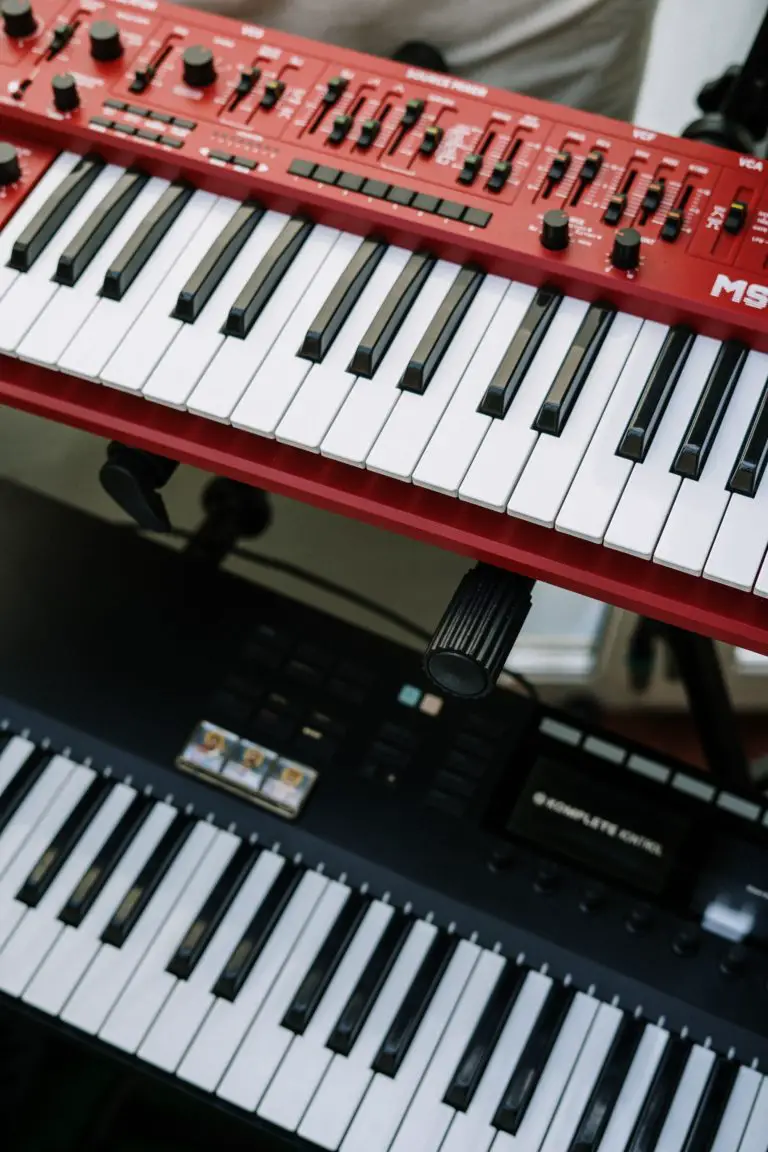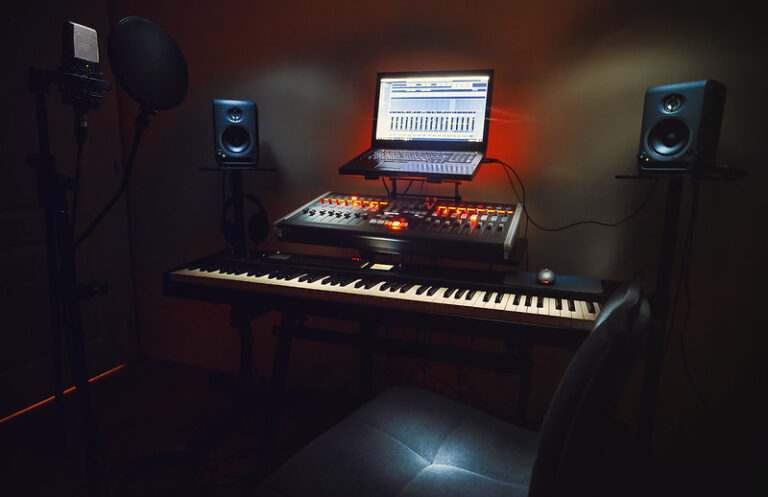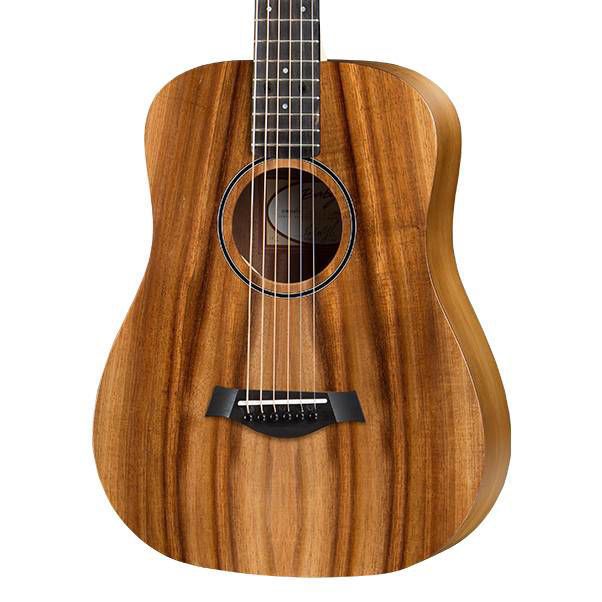Can You Sign Yourself to Your Own Record Label?

Many people are new to the music industry and may wonder whether or not it’s possible to sign themselves to their own record label. So, can someone sign themselves to their own record label?
You can sign yourself to your own record label. Setting up a record label for yourself is simple and has many potential benefits, including owning the master rights and gaining a firm grasp on profits and distribution. Although there are many steps to signing one’s own record label, it’s worth it.
Now that we know someone can sign themselves to their own record label, we will go over the steps for how to do that and the many benefits of signing their own record label.
What You Must Do Before Starting Any Record Label
When thinking of starting your own record label, you might ask these questions:
- What’s the point?
- How do I know where to start?
- What should I know?
- How can you learn more about record labels?
One way to answer your questions is online research, another way is through experience, trial, and error, and another way is by learning from someone who has done it themselves. This is why you should start with this book by music veteran, Benjamin Groff.
- Groff, Benjamin (Author)
- English (Publication Language)
- 227 Pages – 12/21/2020 (Publication Date)
While learning from someone who has been there is great, you will make mistakes.
It’s your experience and your persistence in the industry that will benefit you over time. But to get started, you need to just do a ton of research and read everything you can to learn about how to pursue this passion.
How to Make Your Own Record Label (and Sign Yourself to It) | Step-By-Step
Starting a record label and signing yourself may seem complex, but with the right guidance and determination, it’s more than possible. Below are the crucial steps you need to follow to achieve this:
1. Define Your Vision
The first step in creating any successful business, including a record label, is to have a clear vision. This should include your label’s mission, its aesthetic, the type of music it will produce, and your long-term goals. Your vision will guide every decision, so it’s crucial to get it right.
Since you are signing yourself, this vision should be aligned with the kind of music you make. You might also ask yourselves about the long-term goals of this business. Do you want to sign other people? What’s the goal of signing to your own record label? Where do you see yourself in a decade?
This is where a business plan comes in handy.
2. Create a Business Plan
Like any other business, a record label needs a comprehensive business plan. This plan should outline the financial aspects of your label, including startup costs, projected income, and marketing expenses. It’s also crucial to detail the strategies you will use to find and reach your audience, your growth plan, and the roles and responsibilities within the label.
Because you will be both artist and owner, your business plan will be slightly different. This is similar to the path of an independent artist, making music and not worrying about the concerns of a record label.
However, there should be a reason for creating your record label. Your eventual goal should be to sign on other artists or understand more of the music business aspects. Maybe you plan on handing it off to a trusted friend at a certain point.
Either way, think of the long and short-term aspects of your business.
3. Legally Establish Your Record Label
In the US, you can file your business as an LLC, Corporation, or sole proprietorship. This is simply done by looking at your city’s website and getting a business license, plus you can also use a lawyer or a service like LegalZoom. Next, you must get an ISRC to stem from the National ISRC agency in your country.
The ISRC is the primary Universal Product Code of the recording business. A business license will cost some money, and any additional costs for logos (if paid for them), trademarks, and all other legal avenues you would want to be covered will cost money.
After the business setup, you can worry about signing up and finding a music distribution company to work with (which should be considered part of these steps). From there, you can invest in yourself and the record label structure, using the knowledge to learn multiple aspects of music performance and business.
The juggling can be tricky, and there will be a lot to learn. But, if you are willing to dedicate the time necessary to accomplish these goals, you’ll get there eventually.
But you can’t do it alone.
4. Have a Team
Running a label takes a lot of work, so it’s important to have people to work with you so that you aren’t doing all of the hard work on your own.
Much of running a record label is marketing, sync licensing, and royalties administration. Ensure to get people on board with experience and expertise in this field. This is where networking in the music industry can come in handy.
But, how can you do that if you are new and have a low budget for things, let alone hiring other people? People will rarely work for the promise of future capital. So this is why it’s important to have money set aside for these experts.
You’ll also need your own expertise for running a music business and forming a team. If you don’t have the expertise yet, consider getting more experience in the music business by working for other music entities.
5. Brand Consistency
When looking at branding, you need to worry about two halves: the band brand and the label brand. Either way, the process of branding is similar between the two.
You want to be able to tell a story within your brand, so it’s incredibly important to stay consistent with your branding. Your brand is important to both potential audiences and the people you may work with in the future.
You will know your brand by choosing a specific genre/sound/audience. So, what is your sound? Is it a cross of multiple genres, or is it solely in one category? Knowing your brand will make it so that your music will attract a specific audience. For instance, Taylor Swift was a country artist and stayed in that genre, but then made changes over the years.
It’s also important to develop a brand name that reflects your creativity and values. You must also acquire a website domain and file a trademark application. But one of the best ways to build a brand is through social media and having the right links to your website that allows people to listen to your music.
For example, Def Jam Records is one of the best-known niche record labels connected to rap and hip-hop. Pay attention to their story below:
On the artist side, allow yourself to write and compose whatever you desire, and later you can worry about what you want to put out. All artists experience writing more songs than they need or want to put on an album, so those are saved in a back pocket to either never be or one day be released.
For instance, Dolly Parton has it set up that some songs of hers will be released after her death. Artists focus on the creative side, while businesses focus on how it brings them back to long-term goals. And yes, you can do both.
6. Have a Contract for Everything
Contacts are legal documents that guarantee a certain level of effort from those you work with. Two of the most important contracts include royalty and distribution contracts.
Royalty contracts determine who gets paid when music is released. Distribution contracts determine who gets paid when records are released. These are the two most common contract types, but contracts should be considered whenever money is exchanged.
If you are offered contracts, then always make sure to read every word. And, if you are worried or do not fully understand the legal jargon, then sit with a lawyer. There are plenty of scams in the music industry, so be careful who you trust.
7. Market Your Music and Your Label
Getting your music out there is just the first step. Next, you need to market it effectively. Use social media, email newsletters, music videos, and live performances to reach your audience. Collaborating with other artists or influencers can also be a powerful marketing tool.
When marketing your label, how you market it might depend on your goals. If you want to sign a few others, you must emphasize how you invest in artists and bands. Good marketing focuses on the benefits you bring to working with you.
Next, you’ll learn more about the steps you need to take to register your business.

Tips When Registering Your Record Label
A record label is not easy to manage, but it can be worth it for you. Registering your record label takes steps and is a process, but you will come to love the different aspects of the business over time. Also, you need to know about the parts of the business that are record labels.
The record label handles the marketing, distribution (through a music distribution company), promotions, and recordings. It covers your image, and if you were signed to a common or well-known record label, then you would be able to make business connections and network with other artists.
The other aspect of the business is distribution. As a record label, you will find the best music distribution service that fills your needs and has the connections you want to put your music up on platforms.
1. Look for Investors
It’s important to look for investors because running a label is pretty expensive. It requires investing a significant amount of money to record, promote, tour, and more. Not to mention, you will need to do this full-time, and if you are not making enough money to live off of yet, then you will need an investor to help you fund things.
If you have a little success in the music industry, it is a little easier to acquire investors. You will slowly acquire more investors as you begin to make more of a name for yourself. Remember, investors need to be confident in their ability to get their money back.
2. Tips on finding distribution channels
Next up, you will need to take time to set up your distribution channels. To get your music on to streaming services like Spotify, Apple Music, and TIDAL, you must go through a music distributor. Many are free, but also many that you have to pay. So, research, and don’t be afraid to try different ones out before finding a favorite.
Some help with making products to sell, help you release on different platforms on the same day, and offer help with promotion. So depending on the music distributor you work with, they may help take care of some heavy lifting so that you have less to worry about as a record label owner.
3. Tips for Promotion
Make sure to set up a release cycle and promote your music. You will want to create a schedule for your music and build your audience by setting up a constant release cycle.
Make sure to set up deadlines and define promotional activities. It’s also important to always look for collaboration opportunities to build your network.
Promotion is the key to getting people to listen, stream, or download your music, so you need to research and find what promotion techniques yield the best results in sales. Established record labels know the best ways to promote, so take notes from them and find ways to promote your music through social media so that it is free for you.

Benefits of Signing Your Own Record Label
When you sign your own record label, you have 100% creative control. When you are under someone else record label, they are sometimes controlling when it comes to the music you sing and write. They may think they know what’s best for you and your creative abilities, but this simply isn’t the case most of the time.
Independent artists fully control distribution, marketing, artwork, deadlines, and more. They also have 100% ownership of their music. They can negotiate music licensing and publishing deals. Because they own their music, they also get to keep 100% of their profits. These profits are generated from music sales, streams, licensing deals, merchandise, and other revenue sources.
The internet makes it much easier for independent artists to become popular today. If they release one viral video on TikTok, people will be immediately directed to their music and their brand. Today’s digital era brings so many more opportunities for smaller artists. Musicians have easier access to music distribution, marketing, merchandising, and streaming. Overall, independent artists don’t have to worry about confusing contracts, expensive lawyers, and signing over their music rights.
The Power of Independent Labels
If you sign your own record label, you are an independent artist. This is also known as an “indie artist“. Independent artists are not affiliated with any major record labels.
The major record labels are Universal, Sony, and Warner. Independent labels may collaborate with other small companies for distribution and publishing. Independent labels are more personal and customized. Also, major record label companies do not control them.
While independent record labels may have a harder time promoting their music because they don’t have as much money as major record labels, it’s still possible to thrive and build your niche audience.
Independent labels are becoming increasingly popular today, which can make it more difficult to make a name for yourself in the music industry.
Still, it’s possible because of the growing digital world. Especially because of social media today and the many different tools we have, there are many ways to get your name out there and build your niche audience.
But remember that no matter what advice is out there, the professional opinion of a lawyer working in the music industry will benefit you and help you avoid legal issues from simply not knowing how to navigate the legal side of owning a record label.










